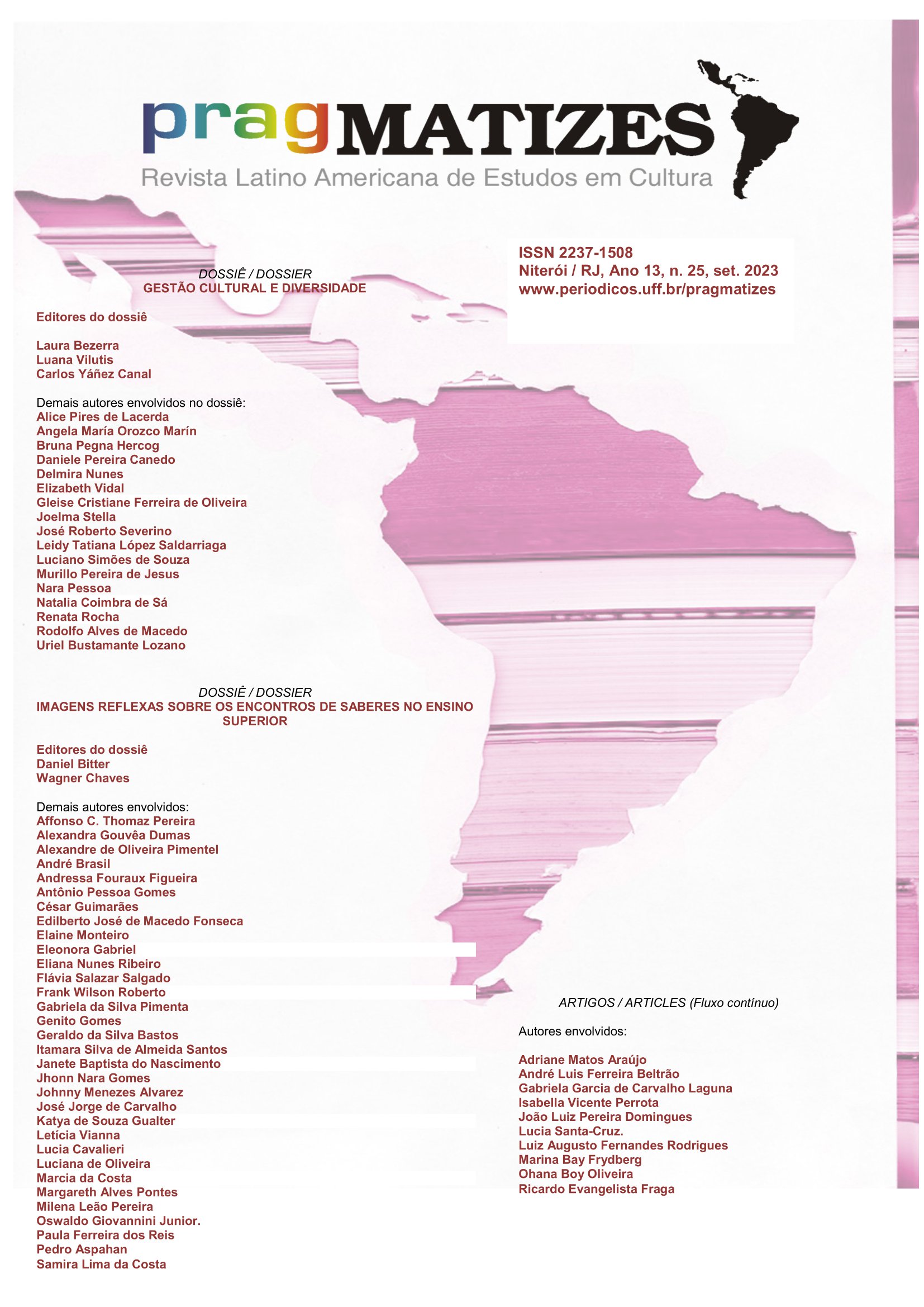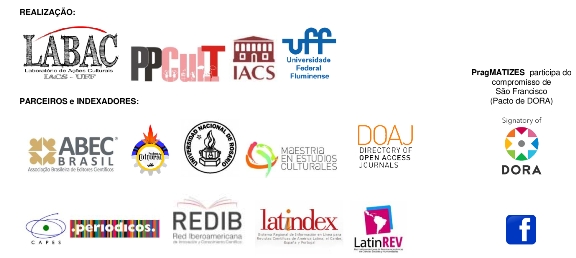SuperSaberes - the construction of the Superintendence of Traditional Knowledge at UFRJ
DOI:
https://doi.org/10.22409/pragmatizes.v13i25.57933Keywords:
Meeting of knowledge, traditional knowledge, Federal University of Rio de JaneiroAbstract
This article is a cartography of the construction process of the Superintendence of Traditional Knowledge at UFRJ, located in the Forum of Science and Culture, the body that coordinates policies for cultural diffusion and scientific dissemination at UFRJ with the objective of promoting cross-cutting actions between the various áreas of the knowledge and strengthenties between the University and civil society. Known as SuperSaberes, this management space is the result of the fight for the recognition of traditional knowledge and popular cultures at the University, coordinated by researchers who, over more than three decades, have been developing work at UFRJ with groups belonging to these communities. A construction woven by friendly sharing and collectively embroidered by the hands of masters of tradition and UFRJ academics inspired and infected by experiences of inclusion of masters of traditional knowledge in Brazilian public universities. The relevance of this manuscript is contextualized to the fact that it recognizes the creation of SuperSaberes as part of the achievements of groups historically violated of their rights in the face of a society structured by racism and the colonial logic still present in the country. It is important to contextualize that the origin of UFRJ is linked to higher education to serve a social and economic elite, but through out its history, it has been crossed by various social, political and epistemological movements, driving transformations. One of these achievements was the democratization of Access through the implementation of Law nº 12,711/2012, known as the Quota Law, which made public universities more plural and diversified. The Law boosted substantial changes in institutional policies, content, programs, menus and references, as well as the entry of students from Black and indigenous communities, posing a new challenge to the university: permanence. In the narratives of these students within the academy, there is an echo of the clamor for the presence of professors and referential bases specific to their peoples, instead of being forced to move within a Euro-Christian referential base, which many times appear as the place of colonizer in its marks, histories and community memories. It is thus, although late in relation to the implementation of policies and affirmative actions related to quotas and the inclusion of traditional knowledge at UFRJ, that this cry calls us to the institutionalization of this the meand this agenda of demands. Finally, we aim to present the important steps taken, and still in franksteps, towards the construction and strengthening of this important institutional space for the management of traditional knowledgeand popular cultures at UFRJ. An invitation article to build new theoretical, institutional, community and spiritual alliances that can help in this unique moment at UFRJ, guiding the next stages of facing the challenges and meeting the joys of fair victories that are pointed out on the horizon.
Downloads
References
ALMEIDA, Sílvio Luiz de. Racismo Estrutural. São Paulo: Sueli Carneiro; Jandaíra, 2020.
ALVAREZ, J.; PASSOS, E. Cartografar é habitar um território existencial. In: PASSOS, E.; KASTRUP, V.; ESCÓSSIA, L. (orgs.). Pistas do método da cartografia: pesquisa-intervenção e produção de subjetividade. Porto Alegre: Sulina, 2009. p. 131-149.
BASTOS, Geraldo da Silva. Mulheres Que Rezam e Curam: Narrativas e Resistências em Nova Iguaçu, Baixada Fluminense (RJ). Dissertação [Mestrado em Psicossociologia de Comunidades e Ecologia Social]. Universidade Federal do Rio de Janeiro, 2020.
BISPO, Antônio dos Santos. Colonização, Quilombos: Modos e Significações. Brasília: Ayó, 2019.
CAMPOS, Yussef; KRENAK, Ailton. Territórios indígenas como lugares de origem - Lugares de Origem. São Paulo: Jandaia, 2021.
CARVALHO, José Jorge de. O lugar da cultura tradicional na sociedade moderna. In: Seminário Folclore e Cultura Popular: as várias faces de um debate. Rio de Janeiro: Instituto Nacional de Folclore- IBAC-RJ, 1992.
GOMES, Nilma Lino. Cotas étnicas. Seminário Ampliação do acesso à universidade pública: uma urgência democrática, 09 de maio de 2003. UFMG, p. 1-9. Disponível em: https://silo.tips/ download/cotas-etnicas-1-nilma-lino-gomes-2. Acesso em: 10 out. 2019.
HADDOCK-LOBO, Rafael. Abre-caminho – Assentamentos de metodologia cruzada. Rio de Janeiro: Ape'S, 2022.
KILOMBA, Grada. Memórias da Plantação - episódios de racismo cotidiano. Rio de Janeiro: Cobogó, 2019
KOPENAWA, Davi; ALBERT, Bruce. A queda do céu: Palavras de um xamã yanomami. São Paulo: Companhia das Letras, 2015.
KRENAK, Ailton. Ideias para adiar o fim do mundo. São Paulo: Companhia das Letras, 2019.
KRENAK, Ailton. Pensando com a cabeça na terra. In: Ailton Krenak - Coleção Tembetá. Lisboa: Oca Editorial, 2019.
LARA, Ivonne. 1992. Letra de Alguém me Avisou © Warner/chappell Edições Musicais Ltda.
MACHADO, Vanda. Irê Ayó: uma epistemologia afro-brasileira. Salvador: EDUFBA, 2019.
MARTINS, Leda. Afrografias da memória: O Reinado do Rosário no Jatobá. 2ª. ed., rev. e atual. São Paulo: Perspectiva: Belo Horizonte: Mazza Edições, 2021.
MIGUEL, Xeramõi (2019). O Arandu de Nhanderu. Vídeo documentário, disponível em https://www.youtube.com/watch?v=RgPf5rZNHHk
NASCIMENTO, Beatriz. Uma história feita por mãos negras: Relações raciais, quilombos e movimentos; [Organização Alex Ratts]. Rio de Janeiro: Zahar, 2021.
NASCIMENTO, Janete. O que nos ensinam os itan? A mitologia Yorubá como forma de enfrentamento ao racismo religioso. Dissertação [Mestrado em Psicossociologia de Comunidades e Ecologia Social]. Universidade Federal do Rio de Janeiro, 2023.
REIS, Paulo José. Narrativas de Ìtán. Rio de Janeiro: 2023.
ROBERTO, Frank Wilson; GABRIEL, Eleonora; SANTOS, Alexandre Carvalho dos. Encontro de Saberes na UFRJ – Cultura Popular e Decolonialidade na formação Universitária. In: Anais do Encontro de Saberes - PPGAC–UFBA. Salvador: UFBA, 2023. Disponível em: https//www.even3.com.br/anais/encontrodesaberesppgacufba/477000-ENCONTRO-DE-SABERES-NA-UFRJ--CULTURA-POPULAR-E-DECOLONIALIDADE-NA-FORMACAO-UNIVERSITARIA . Acesso em: 31 maio 2023.
RUFINO, Luiz. Pedagogia das Encruzilhadas. Rio de Janeiro: Maroula, 2019.
SANTOS, Maria Stella de Azevedo; DOMINI, Graziela. O que as folhas cantam (para quem canta a folha). Rio de Janeiro: Autorale, 2020.
SIMAS, Luiz Antônio; RUFINO, Luiz. A ciência encantada da macumba. Rio de Janeiro: Mórula, 2018.
SIMAS, Luiz Antônio; RUFINO, Luiz. Flecha no tempo. Rio de Janeiro: Mórula, 2019.
SIMAS, Luiz Antônio; RUFINO, Luiz; HADDOCK-LOBO, Rafael. Arruaças-Uma filosofia popular brasileira. Rio de Janeiro: Bazar do Tempo, 2020.
SOUZA, Neusa Santos. Torna-se negro. Rio de Janeiro: Zahar, 2021.
Published
How to Cite
Issue
Section
License

This work is licensed under a Creative Commons Attribution 4.0 International License.
By forwarding an original to PragMATIZES, the authors agree that the copyright related to it is transferred to the Publishing. Articles and other writings are made available in PDF format from their publication, and they can be downloaded to institutional repositories and personal pages, provided that with their proper bibliographic indication.



